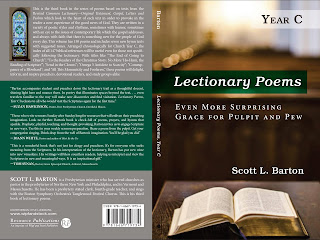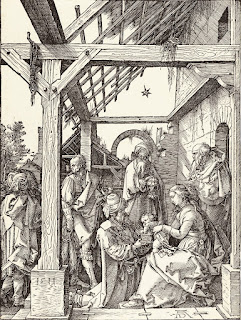Albrecht Dürer: The Adoration of the Magi
1511 woodcut, National Gallery of Art
Isaiah 60:1–6
Imagine a Time
Isaiah here imagines when
The shoe is on the other foot,
And Israel, in exile then,
One day would find acclaim—and loot!
But, though, like gold and frankincense,
The wealth would come, the nation’s light
Would be the draw for those from whence
Dark sadness was the whole world’s flight.
And so, the prophet did not yearn
So much the nation would be great,
But for the time when all would burn
With love the world would emulate.
America, of old, once thought
That we’re a city on a hill,
So, at our best, our nation sought
To be a people of good will.
Can we, whose life might others lift,
Return to how the world might see
This grand experiment a gift
For those who yearn for liberty?
And might the church, a prophet be,
Awakening each neighborhood
To our responsibility
For showing we believe God’s good?
Scott L. Barton
Arise, shine; for your light has come,
and the glory of the LORD has risen upon you.
For darkness shall cover the earth,
and thick darkness the peoples;
but the LORD will arise upon you,
and his glory will appear over you.
Nations shall come to your light,
and kings to the brightness of your
dawn.
Lift up your eyes and look around;
they all gather together, they come
to you;
your sons shall come from far away,
and your daughters shall be carried
on their nurses’ arms.
Then you shall see and be radiant;
your heart shall thrill and rejoice,
because the abundance of the sea shall be brought to you,
the wealth of the nations shall come
to you.
A multitude of camels shall cover you,
the young camels of Midian and
Ephah;
all those from Sheba shall come.
They shall bring gold and frankincense,
and shall proclaim the praise of the
LORD.
+ + +
Matthew 2:1–12
So We Might Kneel
I picture Herod calm and cool,
Who, though afraid, was no one's fool,
And asked the wise men where was born
Messiah, now that he'd been warned.
I picture in his royal world
A Snidely Whiplash, mustache curled,
Whose soto voce, "Bwa-ha-ha"
Lurked underneath his claimed, "Hurrah!"
Once more, then, this Epiphany,
Beware the one who claims to see
The news of Christ with words so glib
He'd keep the baby in his crib—
And do him in! But picture now
Those seekers who could disavow
Belief Jerus'lem was the key
—E'en though Isaiah said 'twould be—
And went with Micah, who proclaimed
That Bethlehem would be acclaimed
The place from whom a shepherd king
To all the world good news would bring!
Another road those magi took,
(The wise men, who at first, mistook
The way of love that God revealed)
So we, like them, in awe might kneel.
Scott L. Barton
(Cf. the Isaiah text [Jerusalem] with Micah 5:2-5a
[Bethlehem])
In the time of King Herod, after Jesus was born in Bethlehem
of Judea, wise men from the East came to Jerusalem, asking, “Where is the child
who has been born king of the Jews? For we observed his star at its rising, and
have come to pay him homage.” When King Herod heard this, he was frightened,
and all Jerusalem with him; and calling together all the chief priests and
scribes of the people, he inquired of them where the Messiah was to be born.
They told him, “In Bethlehem of Judea; for so it has been written by the
prophet: ‘And you, Bethlehem, in the land of Judah, are by no means least among
the rulers of Judah; for from you shall come a ruler who is to shepherd my
people Israel.’” Then Herod secretly called for the wise men and learned from
them the exact time when the star had appeared. Then he sent them to Bethlehem,
saying, “Go and search diligently for the child; and when you have found him,
bring me word so that I may also go and pay him homage.”
When they had heard the king, they set out; and there, ahead
of them, went the star that they had seen at its rising, until it stopped over
the place where the child was. When they saw that the star had stopped, they
were overwhelmed with joy. On entering the house, they saw the child with Mary
his mother; and they knelt down and paid him homage. Then, opening their
treasure chests, they offered him gifts of gold, frankincense, and myrrh. And
having been warned in a dream not to return to Herod, they left for their own
country by another road.











